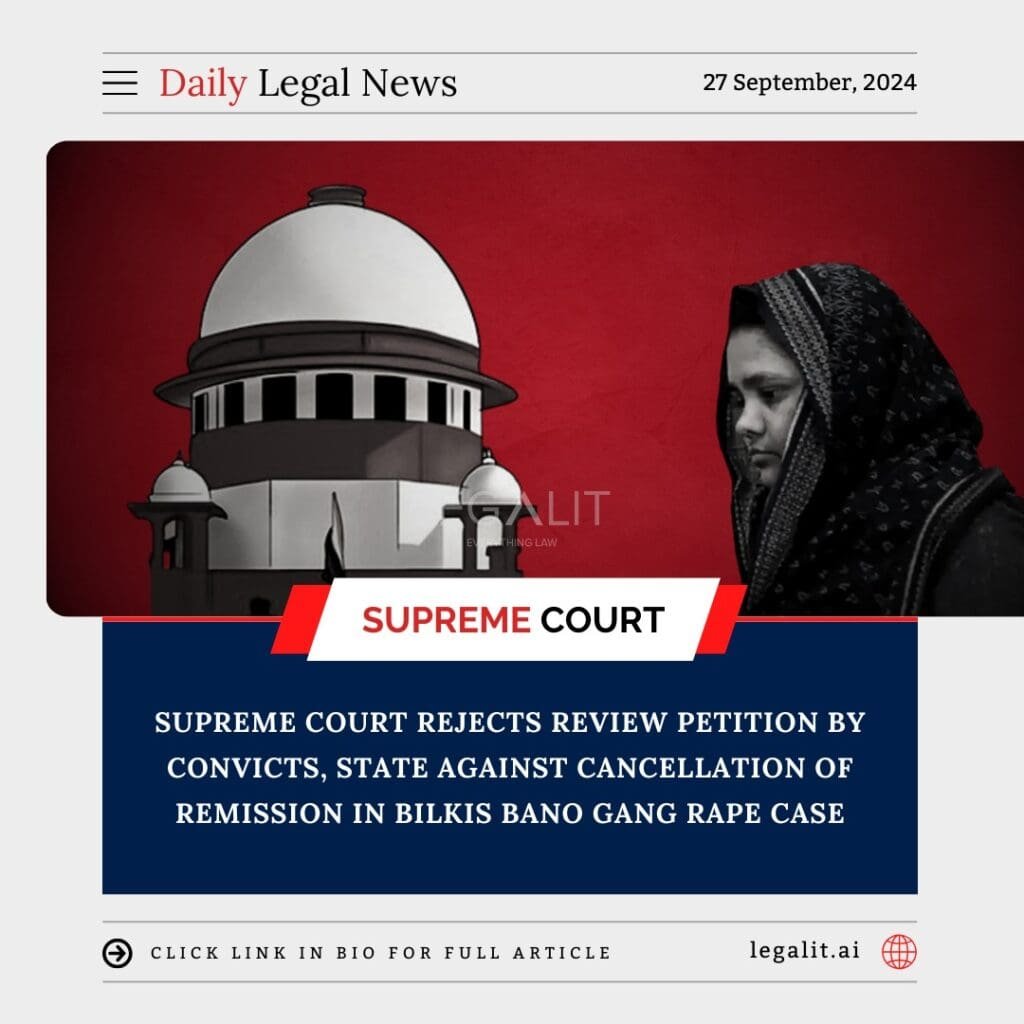
In a significant development, the Supreme Court of India has rejected the review petitions filed by the convicts and the Gujarat state government against the cancellation of remission in the Bilkis Bano gang rape case. The decision reaffirms the apex court’s previous ruling, which had set aside the remission granted to the convicts, marking a major victory for justice and women’s rights in India.
1. Background of the Case: The Horrific Incident
The Bilkis Bano case dates back to the 2002 Gujarat riots, a time of widespread communal violence in the state. Bilkis Bano, a young pregnant woman, was brutally gang-raped while fleeing her village with her family, seeking safety. In one of the most horrifying aspects of the crime, 14 members of her family, including her 3-year-old daughter, were murdered by a mob.
The case drew national and international outrage, becoming a grim symbol of the violence and human rights violations that occurred during the riots. Bilkis Bano fought a long and painful legal battle for justice, leading to the conviction of 11 men in 2008.
2. Remission Controversy
In August 2022, the Gujarat state government granted remission to all 11 convicts, leading to their premature release from prison. This move sparked widespread public outcry, with critics arguing that the remission was a gross miscarriage of justice. Many civil society groups, women’s rights activists, and political leaders condemned the decision, stating that it set a dangerous precedent for crimes against women.
Bilkis Bano herself expressed deep anguish over the remission, stating that it had shattered her faith in justice. The Supreme Court, in an earlier ruling, canceled the remission, stating that the decision to release the convicts was not justified in such a heinous crime.
3. Review Petition: The Arguments
Following the cancellation of remission, the convicts and the Gujarat state government filed review petitions, seeking a reconsideration of the Supreme Court’s decision. The review petitions argued that the remission was legally granted and that the convicts had served a significant portion of their sentence.
The state government contended that it had followed the due process of law while granting remission and that the convicts had demonstrated good behavior during their time in prison. They argued that the decision was in line with legal provisions that allow for the early release of prisoners under certain conditions.
4. Supreme Court’s Decision: A Stand for Justice
The Supreme Court, however, rejected the review petitions, standing firm on its earlier decision to cancel the remission. The bench, led by Chief Justice of India DY Chandrachud, reiterated that the nature of the crime in the Bilkis Bano case was too severe to warrant remission.
The court emphasized that the convicts had committed not only a brutal gang rape but also multiple murders, including the killing of a child. In light of these facts, the court maintained that the remission was an inappropriate use of legal discretion.
This ruling underscores the court’s commitment to upholding justice in cases of extreme violence against women and vulnerable groups. It also serves as a powerful reminder that remission is not an automatic right and must be exercised judiciously, especially in cases involving heinous crimes.
5. Implications for Women’s Rights and Legal Precedents
The Supreme Court’s decision is being hailed as a landmark moment in India’s ongoing struggle for women’s rights and justice for victims of sexual violence. The ruling sends a strong message that the legal system will not tolerate leniency in cases of gender-based violence, particularly when the crime involves mass atrocities like gang rape and murder.
The case also has broader implications for how remission is applied in India. It highlights the need for careful consideration and restraint when granting early release to convicts, especially in cases involving serious crimes. The ruling could set a precedent for similar cases in the future, ensuring that justice is not undermined by administrative decisions to release convicts prematurely.
6. Bilkis Bano’s Journey: A Story of Courage
Bilkis Bano’s journey for justice has been long and fraught with challenges. After the 2002 riots, she had to leave her home and live under constant threat due to her decision to pursue legal action against the perpetrators. Despite the immense personal and emotional toll, she continued to fight for justice, taking her case all the way to the Supreme Court.
In 2019, the Supreme Court awarded her a significant compensation for the trauma she endured. However, the remission of her attackers had once again put her through an emotional ordeal. The rejection of the review petitions provides a sense of closure, reaffirming the justice she fought so hard to secure.
7. Conclusion: A Victory for Justice
The Supreme Court’s decision to reject the review petitions in the Bilkis Bano case is a momentous step toward justice and accountability. It underscores the court’s unwavering stand on crimes against women and vulnerable groups and reinforces the principle that remission cannot be used to undermine the gravity of heinous offenses.
As India continues to grapple with issues of gender violence, the Bilkis Bano case stands as a stark reminder of the importance of a strong and independent judiciary that places justice for victims above all else.